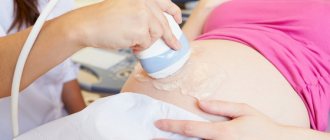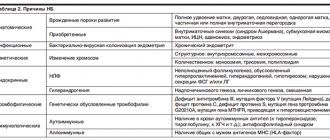Thanks to modern technologies for abortion, a woman has the opportunity to preserve her reproductive function, so that even after the procedure she can conceive and successfully carry a child without problems. However, for this it is extremely important to follow certain recommendations from doctors for recovery after medical termination of pregnancy.
Immediately after the procedure
After a woman takes her second dose at a health care facility, she may spend some time under medical supervision to make sure there are no dangerous short-term side effects. After this she is allowed to go home. However, it is desirable that for some period of time someone close to her will be present who will support her, and if necessary, provide any assistance.
Often women report severe pain and heavy bleeding. This is provoked by the action of the drug and acts as a natural reaction. You can relieve pain with the help of no-spa or some other drugs recommended to the woman by the doctor.
Bleeding is also not dangerous until it becomes too profuse. The upper limit of what is allowed is one large pad, which fills in an hour. In this situation, you should contact an ambulance immediately.
A few days after the abortion, you need to visit a medical facility again to undergo a repeat ultrasound examination. In 1-2 percent of cases, the fertilized egg does not leave the uterus. In this case, it must be removed using curettage or vacuum aspiration.
Within 2-3 days the bleeding should stop, being replaced by fairly weak spotting. In this form, it can last on average from 1 week to a month.
The day bleeding begins is considered the first day of the menstrual cycle, but menstruation should begin after the usual number of days.
Symptoms after an abortion when you should consult a doctor
- Increased temperature (more than 37.2 0C) 2 weeks after the abortion, which is not relieved by medications for 2 days or more;
- Heavy bleeding that tends to increase. Bleeding after an abortion is an inevitable phenomenon, but it should decrease, and not vice versa;
- Blood clots the size of grapes or larger;
- Severe pain in the lower abdomen;
- Unpleasant and specific vaginal odor;
- Long-term continuation of pregnancy symptoms;
- blood in stool or urine;
- Frequent dizziness, nausea, fainting.
How to relieve pain and cramps
After an abortion, spasmodic pain is constant and can come and go. There is nothing scary about the fact that spasms, cramps and pain accompany the patient in the first two weeks after an abortion.
Recommendations:
- To relieve symptoms, it is recommended to take medications such as Paracetamol and Ibuprofen. It is forbidden to take Aspirin, as it tends to increase bleeding.
- If there is pain in the lower abdomen, you can place a heating pad or a bottle of warm water wrapped in a towel, which will alleviate the condition.
- It is necessary to surround yourself with comfort, tranquility and devote a lot of time to sleep.
General advice for women on recovery after medical termination of pregnancy
Usually, after a medical abortion, doctors give general recommendations aimed at the normal recovery of the patient, which should minimize the risk of any dangerous consequences. The main ones:
In the first 3-4 weeks after termination of pregnancy, you must completely avoid going to the pool, sauna, solarium, and you should also not swim in open water or bathtubs.
You should temporarily avoid physical activity and get plenty of rest.
You need to adhere to proper nutrition, a maximally balanced diet, and take a complex of vitamins.
You need to monitor your condition very carefully, especially the nature of vaginal discharge. If they become too abundant, an unpleasant odor or skin irritation appears, you should immediately consult a doctor.
Sexual intimacy should be completely abandoned until the end of the first menstruation.
If the monthly cycle does not return to normal within 2-3 months, additional examination may be necessary, as well as correction of the woman’s hormonal levels.
In the first six months after termination of pregnancy, it is necessary to carefully protect against possible pregnancy, as it will be an extremely serious burden on the woman’s weakened body.
Follow these tips to help you recover from medical abortion
, you can significantly reduce the likelihood of developing side effects and consequences negative for women’s health.
Tips for the period after an abortion
General tips for this period:
- It is required to exclude sexual activity for several weeks. It is better to abstain from it until the postoperative menstruation ends. This will make recovery more productive. You should be extremely careful after surgical termination of pregnancy. During sexual intercourse, complications may occur, for example, bleeding is possible. Negative manifestations can contribute to the entry of harmful microorganisms into the body.
- After an instrumental abortion, you should not engage in physical activity for two weeks. This time is needed for the muscle potential of the abdomen to recover in a calm mode (without stress). You should not carry heavy weights for the first time after surgery. In general, sport is a necessary means of rehabilitation, but you should not start physical exercise immediately after an abortion. The body needs to restore its reserves to withstand external irritants.
- Baths, open water swimming, and swimming pools are contraindicated. This is necessary to protect the body from infection. The only thing you can do is take a warm shower.
- It is also necessary to eat right. Even before you have surgery, you need to ask your doctor what diet he would recommend for the rehabilitation period. Termination of pregnancy is stressful for all functions, organs and other components of the body. After the operation, he is exhausted and therefore needs to be replenished with vitamins and other useful microelements. The intake of proteins and fiber is especially important.
- You need to carefully monitor the condition of your body. Sometimes symptoms can lead to pathologies. So, you need to take your temperature at least once a day, check your pulse, blood pressure, and monitor your general well-being. If serious deviations from the norms occur, you should immediately go to the hospital.
- After surgery, it is important to maintain personal hygiene, especially the genitals, which can be penetrated by bacteria. It is necessary to wash several times a day. This will contribute to the rapid recovery of the body. Underwear is also important. Thongs and tight shorts should not be worn; preference should be given to thong panties or pagence slips. It is necessary to use pads for daily use and change them every few hours. Tampons are contraindicated.
- After an abortion you should also take antibiotics. Experts recommend starting to drink them immediately after surgery. During the period of drug treatment, it is important to exclude alcohol so that there is no additional risk of complications. It should not be used for another week after antibiotic treatment. The reason is that after taking medications, the body needs time to digest them and for them to take effect.
Pregnancy after medical termination of pregnancy
In fact, having had a medical abortion, a woman is likely to have another pregnancy within 15 days. You need to understand that such an early pregnancy is highly undesirable, since the body needs more time to fully recover after medical termination of pregnancy
.
Therefore, the best option would be to use contraception during sexual intercourse for at least six months after the procedure. It is necessary to understand that you should not select a contraceptive on your own - this issue must be entrusted to an experienced doctor who knows the woman’s body and understands the importance of the correct prescription.
How is it carried out?
“According to the legislation of the Russian Federation, abortion is not carried out immediately, but after a day of silence. The woman is given time to think. In addition, the patient must give informed consent to the abortion, confirming that she was informed of all possible consequences,” explains the specialist.
Medical abortion is performed in two stages using two types of drugs.
To begin with, the gynecologist examines the woman, identifies the exact duration of pregnancy and the presence of contraindications.
What is the probability of miscarriage after medical termination of pregnancy?
This question interests most women who have undergone or are planning to undergo a medical abortion procedure. In fact, pharmacological termination of pregnancy is not capable of causing a miscarriage in the future, after some time (provided that the manipulation was successful at the time). However, there is one “but”, which is that quite often a woman becomes pregnant before her body recovers. In such a situation, there is, of course, a possibility of miscarriage. However, in this case, the cause will not be medical termination of pregnancy, but the unpreparedness of the body and personal ignorance.
For a woman’s body to fully recover after an abortion, some time must pass, more precisely, at least six months. Only after such a period of time, using all the above recommendations for recovery after a medical abortion, is it likely that an absolutely normal pregnancy will occur without any consequences.
It is important to understand that even if a miscarriage occurs, or if the course of pregnancy is completely normal, you should still immediately consult a doctor. Only after going through all the examinations that the doctor prescribes can you be sure that everything is fine with you and your unborn baby.
recovery after medical termination of pregnancy
Recovery after surgical abortion
Basically, all restrictions on exercise, medications, treatment methods, and recovery of the body after surgery do not differ from the recommendations of doctors after a medical abortion. However, after an instrumental abortion there may be other consequences and complications, and therefore a different recovery.
In case of injuries to the genital organs and tract after an instrumental abortion, the correction process can be very delayed. This operation occurs “by touch”, and, despite the doctor’s qualifications, there is a possibility of damage to the uterus, cervix and cervical canal.
In case of damage to the uterus, a woman experiences the following symptoms:
- Severe, cutting pain in the lower abdomen;
- High temperature (38 0C);
- Bleeding;
- Weakness and dizziness;
- Pallor, tachycardia and low blood pressure.
Confirmation of damage is necessary using transvaginal ultrasound examination of the genital organs and laparoscopy.
A patient with uterine injuries must be hospitalized for surgery and suturing of the wounds. After surgical treatment, rehabilitation therapy includes bed rest and complete physical and psychological rest. Rehabilitation therapy consists of a course of antibacterial drugs, diet, and physical labor is excluded. Subsequent pregnancy is possible only after 1 year and under the strict guidance of an obstetrician-gynecologist.
How to restore hormonal levels after an abortion
Many gynecologists recommend that their patients take a course of birth control pills after an abortion procedure. This must be done within the time frame specified by the doctor, approximately three months. This is necessary in order to normalize a woman’s hormonal levels and undergo rehabilitation. Some of the most common drugs are:
- Belara;
- Zoely;
- Jess;
- Jess Plus;
- Dimia;
- Jeanetten.
However, you should not take the first contraceptive pill that comes to hand without consulting a doctor, this can only harm your health.
Abdominal pain after abortion
Within a week, women may experience abdominal pain after an abortion, or rather, its lower region. These sensations cause discomfort, but do not interfere with a normal lifestyle. If the pain suddenly intensifies and you cannot tolerate it, you should immediately consult a specialist.
• development of hematometra - accumulation of blood in the uterine cavity, which can be caused by the remnants of the fertilized egg. In this case, there is a sharp, cramping pain;
• inflammatory process, the source of which may be hidden sexually transmitted infections. Aching pain is accompanied by an increase in temperature.
If your back hurts after an abortion, there is also an explanation for this. Excessive physical activity can cause discomfort after termination of pregnancy. However, it is worth noting that mild nagging pain in the back, due to processes occurring in the body, is considered normal after an abortion. The increased nature of the sensations should be a reason to visit a doctor.
In general, pain in the abdominal area after an interruption is considered acceptable. The pain syndrome has been bothering me for about a week. If the pain syndrome literally constrains, the woman cannot tolerate such pain, then she needs to consult a gynecologist. Painful complications can be caused by a variety of conditions.
- If you are bothered by sharp, cramp-like pain, this is due to the presence of residual embryo-placental particles in the uterine cavity or the formation of hematometra.
- Constant, aching painful sensations with hyperthermia indicate the onset of an inflammatory process caused by an infection that was previously latent.
- In the first few days, an increase in thermodynamic parameters is quite normal, but when the temperature exceeds 37.5 degrees for more than two or three days, urgent medical intervention is necessary.
To prevent the development of inflammatory complications after abortion, girls are prescribed antibiotics and anti-inflammatory drugs for 5-7 days. Such preventive treatment is especially important for patients who have bad smears or blood tests, urine tests, etc.
How often can you have an abortion?
Contrary to popular belief, there is no certain number of abortions after which you will no longer be able to have children. Everything depends purely on the health and physical endurance of the woman, but the factor of the specialist who performs the procedure is also important, as well as his qualifications, the equipment of the clinic and the type of abortion itself. But we should not forget that every abortion is a serious shock, both for the woman’s psyche and for her body. Therefore, some women, after several abortion procedures, risk never having children again.
« How to behave after an abortion
How to get pregnant quickly after an abortion »










